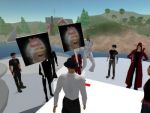 Alweer even geleden, maar ik was er helemaal over vergeten te bloggen. Dit voorjaar volgde ik het interessante mastervak Electronic Commerce: international legal aspects bij de Universiteit van Tilburg. Samen met twee medestudenten schreef ik als onderdeel van dat vak de column “Real human rights in virtual words”, die werd gepubliceerd bij NJblog:
Alweer even geleden, maar ik was er helemaal over vergeten te bloggen. Dit voorjaar volgde ik het interessante mastervak Electronic Commerce: international legal aspects bij de Universiteit van Tilburg. Samen met twee medestudenten schreef ik als onderdeel van dat vak de column “Real human rights in virtual words”, die werd gepubliceerd bij NJblog:
Virtual worlds are artificial, fictitious, and invented, they are unreal. But this does not mean they fall entirely outside the ambit of reality – or the law. Virtual worlds are no longer “just a game for nerds.†By 2011, four out of every five people who use the internet will work or play in virtual worlds. 1 Millions of people spend a large portion of their waking lives in virtual worlds.2 And more than just work or play: they form communities, social groups of people that share a common interest or background. Virtual worlds therefore mean a great deal to a large number of people and social activities that are conducted in virtual worlds should be protected by real-world laws.People and communities have human rights. They are allowed to assemble on the church square, demonstrate in front of the town hall or preach their convictions in the park. But how far do these rights go in virtual worlds? Operated by companies and regulated by the End-User License Agreement (EULA), these worlds are private spaces. While most human rights are also in force in horizontal relations between citizens, it is possible to surrender the exercise of these rights as a condition of access to someone else’s private space.
Lees verder in Real human rights in virtual worlds bij NJblog.
En teken daarna snel alsnog in voor mijn boek!
Arnoud<br/> (Afbeelding via Freakitude)